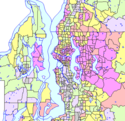The Economist magazine's "Economic Intelligence Unit" (EIU) has published its most recent survey of the most livable cities in the world.
Vancouver, Canada, ranks number one, Vienna, Austria number two, Perth, Australia number five, Geneva number 8, Zurich, number 9, (both in Switzerland) and Auckland, New Zealand, number twelve. read more »






















